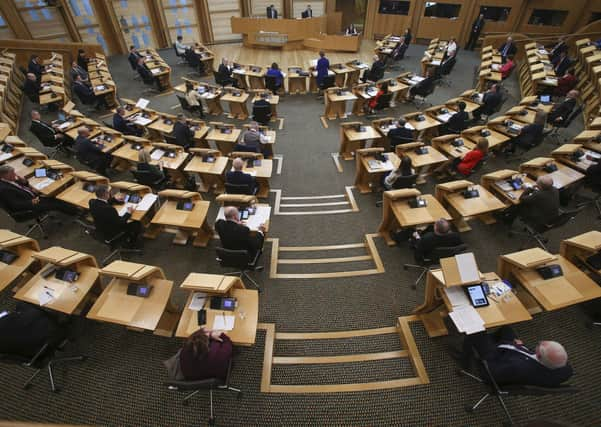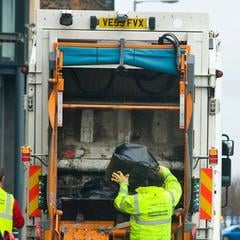Covid-19: MSPs must not allow people to be forced back to work amid pandemic – Richard Leonard


The Scottish Parliament will reconvene in Edinburgh this afternoon. But this single event must not be merely symbolic of parliamentary scrutiny, it must usher in a new phase of heightened accountability and greater openness.
The daily diet of Government briefings followed by questions from the media are important. Regular ministerial meetings with trade unions and employers’ organisations and bodies like the Convention of Scottish Local Authorities are welcome. We have seen change result because of them. But in any representative democracy, a government must be accountable to members of parliament, that is, those elected by the people to represent them precisely for that purpose.
Advertisement
Hide AdAdvertisement
Hide AdThis is a time of national emergency and for reasons of safeguarding public health and saving lives, many of the civil liberties we take for granted have been suspended.
That is all the more reason for an intensification rather than a dilution of parliamentary scrutiny. That means Members of the Scottish Parliament from all parties should have access to fully question Government ministers who are running the country during these most extraordinary of times.
There is huge frustration that this has so far not been provided for. There have been party leaders’ virtual question times during the Easter recess which have allowed issues like the shortage of PPE, the desperate conditions in our care homes and the importance of testing, tracing and tracking to be raised directly with the First Minister. But it could go much further and it is important that the Parliament asserts its authority over the Executive to do that when it meets today.
One reason why this not only matters but why it is urgent is because of the decisions that will be taken in the coming days over the so-called “exit strategy”. Everywhere around there is mounting pressure to restart the economy. With the Office for Budget Responsibility predicting last week that economic output will plunge by 35 per cent in the second quarter of this year and that unemployment will rise to one in ten of the workforce by the summer based on an estimate of two million people losing their jobs, the state of our economy is without question critical.
But the first response of governments must be to intervene through measures like the Job Retention Scheme, launched online just this week, rather than bow to the pressure for early release from economic lockdown. In the end, this will be a political choice. For me the choice is clear.
Young workers hardest hit
Put simply, people’s lives and well-being must be placed ahead of business considerations. We cannot allow a forced return to work. We cannot put protecting the economy before protecting the people.
We know already that the burden of risk in this pandemic is not evenly spread. That it is often lower paid workers in care, retail, food production and distribution and delivery whose exposure to the virus is greatest. And all too many of them on zero-hours contracts, working for employment agencies or in the gig economy even in the midst of this national crisis when we are relying so much on them.
We know as well that, as the Institute for Fiscal Studies has recently pointed out, one in three of people working in the bottom tenth of the distribution of earnings are those who work in businesses like restaurants, bars, non-essential retail, and leisure facilities – those sectors which have been closed down.
Advertisement
Hide AdAdvertisement
Hide AdWe know that young workers have been hit the hardest because they are two-and-a-half times as likely to work in those parts of the economy compared to other employees, and that women are about one third more likely than men to work in a sector that is now shut down.
There is a health dimension to this inequality at work too. Whilst private affluence is no shield against this public pandemic, we know that people with underlying health conditions are more likely to be seriously affected by the Covid-19 virus.
And in this unequal society, we know that health inequality reflects income inequality, so that the poorer economically you are, the poorer your health is likely to be, and the greater the chances of being exposed to the risks to health and life that this virus brings.
Equal right to treatment for all
So the parliamentary scrutiny which we now need is about ensuring that the real-lived experiences of people have an influential bearing on the decisions made by both governments. That the plan for the economy as well the strategy for the pandemic is evidence-led and, first and foremost, health-driven. It will be the job of Labour elected representatives to give voice to the voiceless and to work with the trade union movement to get people at work organised and represented. And to ensure that government decision-making does not exclude those who need to be heard.
The battle that needs to be fought in the here and now is still about getting the right quantity and quality of personal protective equipment to those frontline workers who need it. It is still about the introduction of a comprehensive testing, tracking and tracing policy making the fullest use of all of the testing capacity which exists in both the public and the private sector in the national interest. You cannot fight a virus if you don’t know where it is.
It is about ensuring that the maximum level of income support goes to those who need it. But it is also about the ethics of how we treat our elderly and infirm in the face of this pandemic. Everyone must have an equal right of access to treatment, dignity and respect and so the chance of life itself. That is not only a principle of our National Health Service, it is a measure of our values as a society as well.
And all of these challenges, practical and moral, need to be risen to not as an end in themselves, but as a means to an end, to save lives and to give us all the best chance of staying safe.
Richard Leonard is Scottish Labour leader and an MSP for Central Scotland
A message from the Editor:
Advertisement
Hide AdAdvertisement
Hide AdThank you for reading this article on our website. While I have your attention, I also have an important request to make of you.
With the coronavirus lockdown having a major impact on many of our advertisers - and consequently the revenue we receive - we are more reliant than ever on you taking out a digital subscription.
Subscribe to scotsman.com and enjoy unlimited access to Scottish news and information online and on our app. With a digital subscription, you can read more than 5 articles, see fewer ads, enjoy faster load times, and get access to exclusive newsletters and content. Visit www.scotsman.com/subscriptions now to sign up.
Our journalism costs money and we rely on advertising, print and digital revenues to help to support them. By supporting us, we are able to support you in providing trusted, fact-checked content for this website.
Frank O’Donnell
Editorial Director
Comments
Want to join the conversation? Please or to comment on this article.
